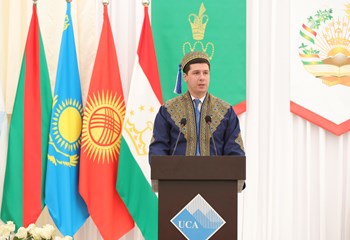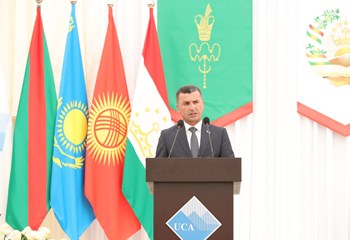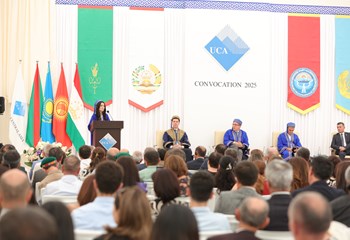Digital transformation is leading a new era of change around the world.
In 2016, the digital economy accounted for 16% of global GDP, and without considering the impact of Covid-19, had been projected to increase to 26% by 2020.
Considering this growth, a country’s digital resilience and ability to develop technology-dependent operational capabilities are becoming increasingly important. Digital resilience uses technologies to make government, business and society more resilient, and adapt to changing circumstances to withstand and bounce back from crises and shocks, such as the Covid-19 pandemic.
To explore new developments, the University of Central Asia, in partnership with the State Committee for Information Technology and Communications of the Kyrgyz Republic, and the World Bank, held an online Conference on "Why Countries Need Digital Resilience Strategies: Safeguarding Digital Transformation in the Age of Covid-19" on June 30th, 2020. It provided a platform to raise awareness about digital resilience, and shared views from an international panel of cyber security experts. The Conference also discussed action plans for the government and other stakeholders to better manage crisis situations such as the Covid-19 pandemic.
This Conference, taking place in the year designated in Kyrgyzstan for the Development of Regions, Digitisation and Support of Children, brought together over 100 participants online. It was also one of the outcomes inspired by the Digital Transformation in Central Asia (DTCA) Conference held in Bishkek last October, inaugurated by the President of the Kyrgyz Republic, Sooronbai Jeenbekov.
Altynbek Ismailov, Chairman of the State Committee of Information Technology and Communications of Kyrgyz Republic, in his opening remarks highlighted “Kyrgyzstan is committed to mobilizing the IT community in the country to respond to the challenges of digitisation, so that the citizens of our country can reap the benefits of technology.”
Rafal Rohozinki, CEO of the SecDev Group (Canada), delivered the keynote address on “Securing and Sustaining Digital Transformation under Covid-19,” where he presented a proposed framework for investments and priorities to strengthen digital transformation. It was followed by a panel discussion on "Why Countries Need Digital Resilience Strategies," with Oleg V. Petrov, Digital Resilience Lead for Central Asia at the World Bank. Other speakers included Melissa Hathaway, President of Hathaway Global Strategies LLC; Andrew Stott, Former UK Government Deputy Chief Information Officer and Chair of the UK Government Chief Technology Officers Council ; Randeep Sudan, Founder of Multiverz in Singapore: Bolormaa Amgaabazar, World Bank Country Manager for the Kyrgyz Republic; Louise Chamberlain, United National Development Programme Resident Representative for the Kyrgyz Republic; Farid Nakhli, Programme Coordinator at the International Telecommunication Union; Prof. Dr. S. Sohail H. Naqvi, Rector of UCA, and Shaukat Ali Khan, Chief Information Officer at UCA.
“Countries become resilient when they embrace digital transformation, and governments are pivoting to digital infrastructures to deliver essential public services, healthcare, education, and sustain the economic livelihoods of populations,” said Rafal Rohozinki. “Digital resilience is at the core of securing the foundations of digital transformation, and countries with a higher digital transformation score have generally done better in responding to the challenges of Covid-19, than those that ranked lower.”

 The event was made possible in part thanks to the contribution of Korea – World Bank Partnership Facility (KWPF), a trust fund administered by the World Bank.
The event was made possible in part thanks to the contribution of Korea – World Bank Partnership Facility (KWPF), a trust fund administered by the World Bank.







